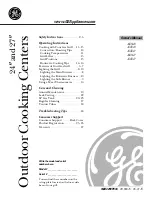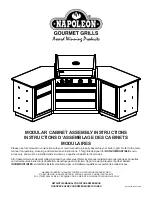
6
b) If the supply cord is damaged, it must be replaced
by the manufacturer,
its service agent or similarly qualified
persons in order to avoid a hazard.
Additional safety rules for drill presses
WARNING.
For your own safety, do not try to use your
drill press or plug it in until it is completely assembled and
installed according to the instructions and until you have
read and understood the following:
1)
Your drill press must be bolted securely to a workbench.
In addition, if there is any tendency for your drill press to
move during certain operations, bolt the workbench to
the floor.
2)
This drill press is intended for use in dry conditions and
indoor use only.
3)
Always wear safety goggles which comply to a
recognised standard. Use a face or dust mask along
with safety goggles if the drilling operation is dusty. Use
ear protectors, especially during extended periods of
operation.
4)
Do not try to drill material too small to be securely held.
Do not drill material that does not have a flat surface
unless it is clamped securely.
5)
Always keep hands out of the path of the drill bit. Avoid
awkward hand positions where a sudden slip could
cause your hand to move into the drill bit.
6)
Do not install or use any drill bit that exceeds 175mm
(7 inches) in length or extends more than 150mm (6
inches) below the chuck jaws. They can suddenly bend
outwards or break.
7)
Do not use wire wheels, router bits, shaper cutters,
circle (fly) cutters or rotary planers on this drill press.
8)
When cutting a large piece of material make sure it is
fully supported at the table height.
9)
Do not perform any operation freehand. Always hold the
workpiece firmly against the table so it will not rock or
twist. Use clamps or a vice for unstable workpieces.
10)
Make sure there are no nails or foreign objects in the
part of the workpiece to be drilled.
11)
Whenever possible, position the workpiece to contact
the left side of the column; if it is too short or the table is
tilted, clamp solidly to the table.
12)
If the workpiece overhangs the table such that it will fall
or tip if not held, clamp it to the table or provide auxiliary
support.
13)
Set the drill press to a speed appropriate to the job.
14)
Do not start the drill press while the drill bit is touching
the workpiece.
15)
When using a drill press vice, always fasten it to
the table.
16)
Make sure all clamps and locks are firmly tightened
before drilling.
17)
Securely lock the head and table support to the column,
and the table to the table support before operating your
drill press.
18)
Never turn your drill press on before clearing the table
of all objects (tools, scraps of wood etc.)
19)
Before starting the operation, jog the motor switch to
make sure the drill bit does not wobble or vibrate.
20)
Let the spindle reach full speed before starting to drill.
If your drill press makes an unfamiliar noise or if it
vibrated excessively, stop immediately, turn the drill
press off and unplug it. Do not restart until the problem
is corrected.
21)
Do not perform layout assembly or setup work on the
table while the drill press is in operation.
22)
Do not exceed the rpm stated on the bit or accessory.
See the instructions that come with the accessory.
23)
When drilling large diameter holes, clamp the workpiece
firmly to the table. Otherwise, the bit may grab and spin
the workpiece at high speed. Do not use fly cutters or
multiple-part cutters, as they can come apart or become
unbalanced in use.
Summary of Contents for DP250LS
Page 16: ......


































